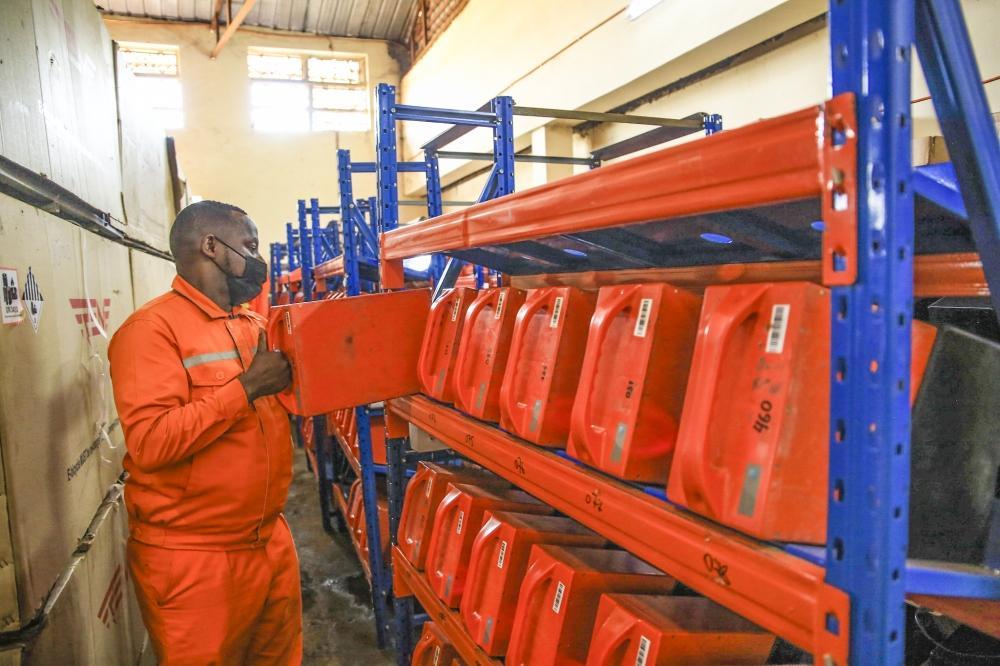Africa-Press – Rwanda. Experts have proposed the establishment of a ‘Green jobs assessment model’ to be considered in the ongoing revision of Rwanda’s $11 billion climate action plan, in order to ensure that environmental and climate change policies create more jobs rather than causing employment losses.
In January 2025, Rwanda launched nationwide consultations to develop a new climate action plan. Known as Nationally Determined Contributions (NDCs), the pledges in the climate action plan—being implemented from 2021 to 2030—represent each country’s efforts to reduce national emissions and adapt to the impacts of climate change.
Rwanda Environment Management Authority (REMA) is leading the revision of the NDCs and consulting a range of stakeholders. NDCs are a key component of implementing the Paris Climate Agreement and are revised every five years.
Experts during a discussion. Rwanda Environment Management Authority (REMA) is leading the revision of the NDCs and consulting a range of stakeholders. Courtesy
The preamble of the Paris Agreement on climate change, adopted in 2015, stresses the close links between climate action, sustainable development, and a just transition—highlighting the importance of “taking into account the imperatives of a just transition of the workforce and the creation of decent work and quality jobs in accordance with nationally defined development priorities”.
Rwanda plans to submit its revised NDCs to the United Nations Framework Convention on Climate Change (UNFCCC) later this year.
Countries are required to update their NDCs periodically, and some announced the revised targets at the 29th UN Climate Change Conference (COP29), which took place in Azerbaijan in November 2024.
François Murwanashyaka, ILO National Project Coordinator for the UN Partnership for Action on Green Economy (PAGE), stated that the Green Jobs Assessment Model should be considered when developing the new climate targets.
“The Green Jobs Assessment Model is a tool or framework designed to help policymakers and stakeholders understand the employment impacts of transitioning to a green economy. It enables users to estimate how environmental policies—such as investments in renewable energy, energy efficiency, or sustainable agriculture—can create or shift jobs across different sectors.”
“We recommend the establishment of the Green Jobs Assessment Model as part of the implementation of the revised NDCs. The tool could be used by the National Institute of Statistics of Rwanda in preparing the labour force survey to ensure green jobs are tracked as Rwanda transitions to a green economy,” he said.
He added that the International Labour Organization (ILO) will assist in collecting data on the current status of green jobs in Rwanda, with the aim of generating policy recommendations for the government.
“The data will inform climate policymakers,” he noted.
David Ukwishaka, Greenhouse Gas Inventory Officer at REMA, noted: “Alignment with national plans including NST2 and Vision 2050, along with strategies to mobilise both domestic and international investment, are key to strengthening our new climate action plan.”
Fred Sabiti, National Technical Advisor on Environment and Climate Change Mainstreaming at the Ministry of Finance and Economic Planning (MINECOFIN) and Technical Advisor at UNDP, said experts plan to explore the recommendations in greater detail.
“We might have decent jobs, but not green jobs—and that contributes to climate degradation. We want to keep opportunities open for everyone involved in the green economy. REMA will consider relevant recommendations during the NDC revision process. It is essential to integrate social inclusion, just transition, climate resilience, and green economic approaches,” he said.
Germaine Hirwa, Acting CEO of the Rwanda Cleaner Production and Climate Innovation Centre, stressed the importance of collaboration among institutions to address their shared responsibilities.
She said that adopting green practices not only benefits the environment but also helps reduce business costs:
“The green concept is not about incurring additional costs, but about lowering day-to-day expenses through more efficient, sustainable practices and promoting green jobs.”
Daniel Hakuzweyezu, an expert from the Rwandan Extractive Industry Workers Union (REWU), reiterated the need for training workers in emerging clean technologies to prevent job losses.
“Without strategic planning and with poorly designed climate policies, people will lose jobs. The growing demand for green jobs is outpacing current training and education systems. Inadequate consultation and planning could also lead to resistance from affected communities,” he warned.
Valentine Uwamariya, Minister of Environment, stressed the importance of development partners in meeting the targets of the country’s climate action plans during the launch of the nationwide consultations in January:
“To develop an ambitious but achievable NDCs 3.0, we rely on the steadfast support of development partners and stakeholders. We are committed to an inclusive and transparent process in updating our climate action plan.”
The updated NDCs 3.0 (version three) will focus on designing transparent, actionable strategies that not only enhance Rwanda’s climate resilience but also unlock critical climate financing.
“Achieving the NDCs is a global effort—not just Rwanda’s. As we draft this update, involving the private sector, civil society, and all stakeholders will be key to successful implementation.”
The final NDCs 3.0, which will be submitted to the UNFCCC later this year, will serve as a comprehensive roadmap for Rwanda’s future climate action efforts.
For More News And Analysis About Rwanda Follow Africa-Press






